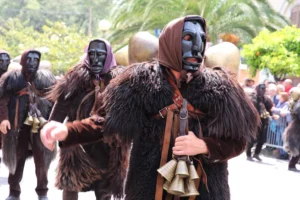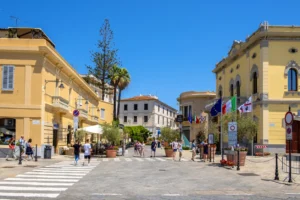Is Sardinian the same as Italian? An Analytical Delve
“Is Sardinian the same as Italian?” That’s a query often asked by people passionate about languages, or people who would like to learn a little about the language before their trip to Sardinia. The answer, however, is not as straightforward as one might assume.
Sardinia, a Mediterranean gem, welcomes you not only with its pristine beaches and captivating natural reserves but also with its rich, enticing linguistic heritage. Sardinian, or Sardo, as it’s locally known, is the primary indigenous language of the Sardinia island.

By contrast, Italian is the official language of Italy, including Sardinia. Although Sardinian and Italian are both Romance languages and Sardinia is a part of Italy, they are not the same. Sardinian, in fact, boasts its separate language tree, making it uniquely different from its Italian counterpart.
The Distinctions between Italian and Sardinian Languages – An In-Depth Look
In answering the question, “What is the difference between the Italian and Sardinian language?” it’s important to delve into some history and linguistics.
Italian, the official language of Italy, stems primarily from the Tuscan dialect, notably from the city of Florence, largely due to the cultural and literary influences during the Italian Renaissance. Italian belongs to the Italo-Dalmatian subgroup within the Romance languages, which in turn are a part of the larger Indo-European language family.
On the other hand, Sardinian, or “sardu,” considered one of the most conservative Romance languages, traces its roots to the ancient Latin spoken by the Romans. Sardinian did develop in a more isolated environment compared to Italian, allowing it to maintain elements of the Proto-Romance that other Romance languages, including Italian, have lost over centuries of influence and evolution.
In terms of vocabulary, syntax, and pronunciation, Sardinian and Italian exhibit significant differences. For instance, the Sardinian language has a more phonetic spelling, it basically means that words are written as they sound and vice versa, which is not always the case in Italian. Also, Sardinian vocabulary includes many words that you wouldn’t find in Italian or that have different meanings in Italian.
Moreover, it’s important to understand that Sardinian itself is not uniform across the island but rather varies into diverse dialects, two main ones being Logudorese and Campidanese.
So, while both Italian and Sardinian share a common lineage in ancient Latin, their evolution over time has resulted in two distinct languages that offer a fascinating insight into Italy and Sardinia’s culture and history.

English Proficiency in Sardinia – A Realistic Perspective
So, you might be wondering, “Do they speak English in Sardinia?” While it’s not an official language, English is spoken to varying degrees in Sardinia, much like in many other parts of Italy.
In popular tourist areas and upscale hotels, you will likely encounter locals who can communicate effectively in English. Younger generations especially, due to their contemporary education which often emphasizes learning the English language, are likely to have a good grasp and be able to converse quite comfortably.
However, outside of these tourist areas and amongst the older generations, English may not be as widely spoken. Many Sardinians primarily speak Italian and Sardinian, both in their households and in daily life. Therefore, a visitor could potentially experience language barriers. But don’t let that deter you! Sardinians are known for their hospitality and will try their best to communicate even if English is not their forte.
Moreover, recognizing a few basic Italian or Sardinian phrases can greatly bolster mutual understanding and immerse you deeper into the enthralling Sardinian culture. You might even pick up more of the local language than you’d expect!
So, while English may not be widely fluent amongst all Sardinians, it does have a presence on the island – and remember, smiles and gestures are universal!

Language Essentials for Visiting Sardinia – A Handy Guide
“So, do you need to speak Italian to visit Sardinia?” Not necessarily! As a traveller, knowing the local language isn’t a must-have, although it certainly can make the experience even richer.
In more touristic areas of Sardinia, as we previously explored, you’ll find that many locals, particularly in hotels, restaurants, and other tourist-focused services, do have satisfactory knowledge of English. So, those not fluent in Italian or Sardinian can still navigate their way around comfortably.
However, it’s worth mentioning that mastering a few common phrases and expressions in Italian (or even better, in Sardinian!) can significantly enhance your travel experience. Simple phrases like “Buongiorno” (Good Morning), “Grazie” (Thank you), or “Quanto costa?” (How much is it?) can take you a long way. Locals tend to appreciate when visitors make an effort to communicate using their language, and such interaction often leads to more meaningful and enjoyable travel experiences.
So, while knowing Italian isn’t necessary for a visit to Sardinia, a little language preparation can go a long way towards breaking the ice and bringing you closer to the heart of Sardinian culture.
What are some Sardinian popular words?
| Sardinian Word | English Translation |
|---|---|
| Babbu | Father |
| Mamma | Mother |
| Amigu | Friend |
| Amore | Love |
| Domo | House |
| Abba | Water |
| Fratelli | Brothers |
| Sorella | Sister |
| Bidda | Village |
| Festa | Party/Celebration |
| Buonu | Good |
| Umbra | Shadow |
| Grazia | Thank you |
| Buon appetitu | Enjoy your meal |
| Arrivederci | Goodbye |



